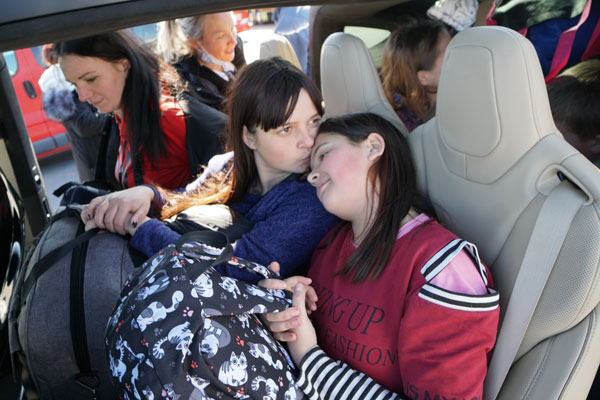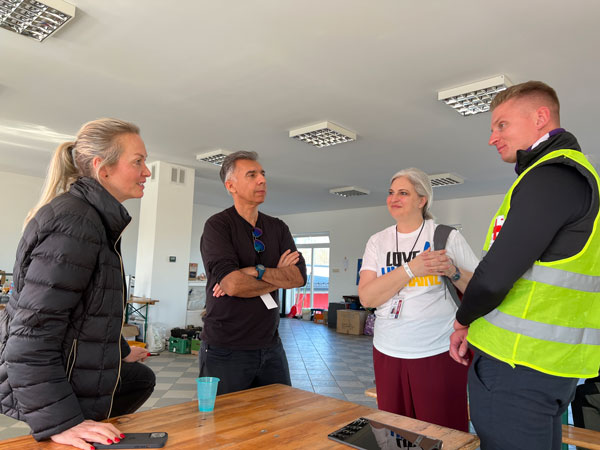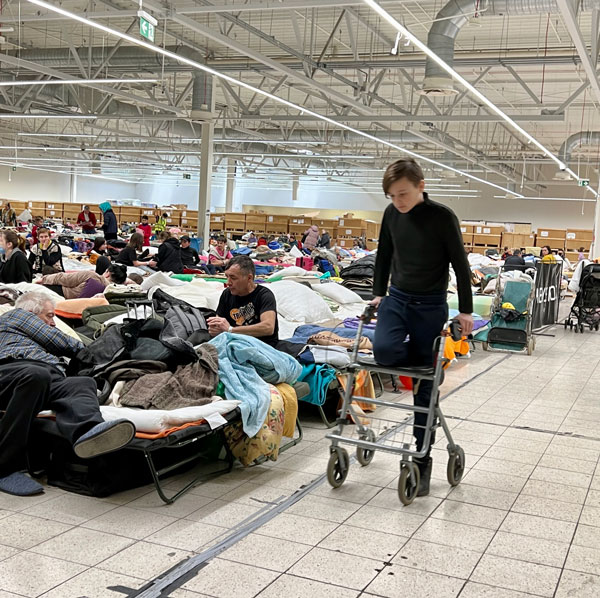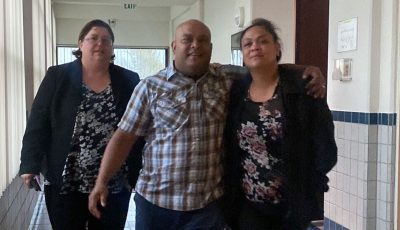Hope at the Ukraine border

Preparing for the journey from Poland to France. (CHRISTOPHER BRISCOE)
I stand in the Tesco Center in Przemysl, Poland, 12 kilometers from the Ukrainian border, and watch as a new family arrives through the night.
This had been a busy shopping mall, but now emptied of every item and mannequin and shelf and carpet and store sign. It is a refugee center for those fleeing the war. This family (or rather the “remnant” of a family—the men stayed behind) stands for a moment just inside the main entrance, holding their bags, looking around wondering where to go, whom to trust, where to sleep, and what tomorrow will bring. Their faces bewildered.
There, in the wide shopping-mall hallway, a sleepless volunteer greets them and cuts the plastic covers off of two new foam mattresses, lays them on the speckled vinyl hallway tile and gestures to the family that this is their new “home.” The overhead fluorescent lights will be on all day and all night, never turning off—for safety. This family of five will be at the Tesco Center for some days. How many days, they do not know. Where next, they can’t think about. Weary, they set their things down and try to understand how to arrange themselves on the two mattresses.
As I walk through the center, I am constantly holding back tears. Rows of basic canvas camping cots fill the center, touching one another as far as the eye can see. Thousands of children and women lie on them, some sleeping, some on their phones, tired, unsure. One of the storefronts is now a playroom. There are hand-drawn posters taped to the glass from children around the world, who tonight sleep in their own beds, in their own homes, far from this place and all its sorrow. Another store now holds boxes of donated clothes. People trickle in, welcome to take anything they need. An open area where a jewelry kiosk once stood now has tables with flags hung above them, where volunteers invite the refugees to their countries. “The refugees.” I don’t like that word. There is a homogenizing element to it. When I speak, I deliberately say “those arriving from Ukraine.” They are individuals, just like me, who were going about their lives, just like I am, and then, a soulless son-of-a-bitch decided to start murdering them and leveling their cities. Their beloved cities. Their beloved families.

The author, center, meets with other medical volunteers at the Ukraine border. (CHRISTOPHER BRISCOE)
There are a few medical teams here. The Israelis are in a corner space, a former clothing boutique. The windows are now papered over for privacy and a red cross is taped to the front door. Inside, makeshift shelves and bins are full of donated medication. There are three cots for the sick. “We need Acyclovir,” the doctor says. “The stress is causing a lot of people to get shingles.” Further down the hallway, a space manned by a British doctor contains five lawn chairs serving as hospital beds. Here, the sick lay as the British team tries to contain a rotavirus outbreak of diarrhea emerging in the Center. There is also a room, formerly a hair salon, where about 30 women sleep. A volunteer in a neon vest sits at the wide doorless entrance keeping watch, just for a sense of security I suppose, being so close to the center’s main entrance. There is a canteen where food is free, and a spot where dog and cat food is placed in bowls on the ground. And there is a lot of weariness. In everyone’s eyes.
The next morning, we stop at the Tesco Center again to formally register as medical volunteers. There, in the parking lot, we meet Jean-Luc Gadget, a small bespectacled middle-aged Frenchman with a patchy gray-and-black beard and thinning hair. He only speaks French, so Zuza Boczar-Noirbent, our translator, helps him register at the tent for drivers. He is here to pick up refugees. Name, copy of passport, organization, destination. These are some of the measures put in place to prevent human trafficking. In the midst of this suffering, evil still finds opportunity. Jean-Luc is approved. Last night he had arrived with a van full of supplies, and he is now ready to transport five or six people back to France. He has come in an all-electric car, because “F*** Putin. I’m not buying his oil.”

The refugee center in Poland near the Ukraine border. (CHRISTOPHER BRISCOE)
We walk with Jean-Luc to the entrance of the main center, so he can speak to the teenage volunteers guarding the door. “I can come back every couple of hours until you find people who want to go to France,” he says to them. “No need, just wait” the volunteers reply. Forty-five minutes later, as we complete our visits with the medical teams and are leaving, a group of three women and three children are just ahead of us moving tentatively toward the exit with their bags, to join Jean-Luc on a journey across the continent. They have never thought about France in their lives. They have no more idea of where France is, than the average Frenchman, a month ago, would have known where Ukraine is. Perhaps a vague notion, but nothing more. Now they are going. They don’t yet know about the cafés and camembert and vineyards and fields of lavender. A volunteer had simply come by their cots asking for five or six people willing to go, and in a few minutes, they had decided the direction of their lives.
Olga, a middle-aged woman with dyed orange hair, gray roots and a missing front tooth, is wearing white plastic clogs. Her 9-year-old son, Artem, and 12-year-old daughter, Katya, are each clutching a stuffed animal of some sort. Like all the men, their two older brothers and their father have stayed behind in Ukraine to fight the war. There are two young women who look like sisters. I ask Olga how they are all related. She points to the older of the “sisters.” Tatiana is 27 years old, married to Olga’s brother. Tatiana’s younger “sister” is not actually her sister, but her 13-year-old daughter. We all do the math: Tatiana was 14 when she gave birth. This extended family of five is joined by a tall woman in her twenties with long black hair who looks like a model and who has fled with them.
Zuza and I help them pull their collection of suitcases and bags to the car. Zuza, who grew up in Poland, is our medical team’s translator. When she was 17, she went to France to study at the Sorbonne, and some years later, went back, married a Frenchman, and stayed. Having grown up under communism, she is among the last generation of Poles that speaks some Russian and so she can communicate with this family. She helps give courage to Olga as we walk toward the car, telling her about France, about how she herself had moved there many years ago, about how wonderful it is. Olga keeps moving forward, but her eyes are still darting, her brows furrowed, as we arrive at the van.
Jean-Luc’s van is not a van, but a Tesla SUV. The doors opened like wings. With all the seven seats up, the trunk is tiny, and there is no way the suitcases will all fit. Christopher Briscoe, a photojournalist and my close friend from our time together in Ethiopia, has joined me on this trip. Through Zuza he asks Ogla, “As you fled from your home, what was the one thing that you grabbed to take with you.” “Nothing,” she replies. “We didn’t take anything. The sirens sounded and we just ran.” I realize that everything they have with them at this moment are things that they have gathered here at the refugee center since they arrived yesterday. The huge suitcase. The clothes inside. The curling iron. The makeup. The stuffed animal that Artem and Katya each clutch. The backpacks, and handbags, and extra coats. All of this has been theirs for less than a day.
Seeing that there is no room in the tiny trunk, I suggest they leave these things here—that they can easily collect such things again as soon as they get to France. Olga’s sister-in-law has gone back inside the building. The big suitcase, which is the most problematic, is hers. Olga feels she can’t decide for Tatiana, and so she goes to find her. And as Olga walks away to locate her sister-in-law, Artem and Katya stand without their mother for the first time since they fled. Katya with a timid smile looks to Zuza and asks, “Can you hug me while we wait.” Zuza envelops her, strokes her hair, calms her. She pulls Artem into the embrace. Katya and Artem both close their eyes against Zuza’s chest and shoulder, whom they met only five minutes ago.
Olga returns. Her sister-in-law won’t part with the belongings. And it strikes me that these things, these are the seeds of a new life. They won’t be left behind—can’t be left behind. “Is it okay if we take the things out and put them in the trunk,” I ask, “leaving the suitcase behind? There is no other way.” Okay, Tatiana says. And we gently unpack the suitcase and lay the sacred contents loosely in the trunk. Later, Zuza will say, “It was all shit. I can’t believe she wanted to take that shit with her to France.” And it was. But this was theirs.
With the car packed, Zuza hurriedly gives Olga her phone number. “Call me. You can call me any time. I live in the same part of France where you are going.” “Will I be able to go back home?” Olga asks. “Yes. You will,” Zuza assures her, even though she doesn’t know. How could she know? But what else could she say? Hugs are exchanged, tears are wiped. The three fleeing children and two fleeing mothers and one fleeing model squeeze into the three rows of seats, nearly atop one another. Crammed on their laps and jammed at their feet are all their backpacks and bags and stuffed animals and open sodas and chips and pillows and coats. There is no room to move. Jean-Luc asks, “Who gets carsick?” and hands out plastic bags.
As they get into the car, Jean-Luc stands in the cold changing his shirt at the front of the Tesla, with the hood up to protect his modesty. He will stop every two hours for 20 minutes to sleep. But otherwise, it will be a straight 25-hour drive back to France, where he will deliver Olga and her companions to the families waiting for them. He briefs them about the trip so they will know what to expect. He will pay for everything along the way.
He had told us that one of his ancestors had helped build the Statue of Liberty, and that his ancestor’s name is engraved somewhere on the statue. Later, this same ancestor would build tiny replicas of the Statue of Liberty and they would become very popular in France. According to Jean-Luc, people called the small statues, “gadgets,” after their creator’s last name. Eventually, any small mechanical tool would come to be known as a “gadget,” or so the story goes. “It is easy to remember my last name,” says Jean-Luc, “because like a gadget, I am small.”
And he is small, but aren’t we all? After all, in the face of a humanitarian catastrophe of this scale, what can any one of us do? But in Jean-Luc, and in the others, I find the answer. Jean-Luc can drive. Zuza can translate. Chris can tell the stories. They all embody the idea that “the betterment of the world is accomplished through pure and goodly deeds, through commendable and seemly conduct.” The world can be made better. The simple acts of ordinary people—very ordinary people—are the means. None of them are heroes. They are average men and women, who, restless, uncertain, have arisen to play a small, but intensely meaningful part, on this corner of the world stage. Przemysl is full of such people today.
Around me is an intensity that is difficult to grasp: profound anguish and sorrow met by an equal measure of love and kindness. There is hope.
We wave goodbye. Jean-Luc presses a button and the doors of the Tesla come down. Olga’s face is strained holding back the tears. We wait for the electric car to silently start and drive away. And these six people, who yesterday had run empty-handed from their homes to the sounds of screaming sirens and exploding bombs, now set out to a far-away land, once again so disoriented, so scared, so uncertain, so bewildered, and at the same time, so enveloped by the love and compassion of strangers who are busy wiping their own tears.
***
We call Jean-Luc and Olga a few times that day. All is well. They have stopped and Jean-Luc has bought them all a hot lunch. Jean-Luc does not speak Ukrainian or Russian, and they do not speak French. But they all manage, and they drive on.
Two days later, I talk to Zuza, who is back in France, and who has been in touch with Olga. Their host family showers them with kindness. Katya and Artem have already started to learn French and English at the local school. Olga sends a photo of them all in front of a botanical garden. She has traded the white plastic clogs for a fashionable pair of black laceless sports shoes. Her hair is washed and newly dyed (again orange) and she’s wearing sunglasses. “We are here in Paradise,” she writes, “And we thank you and the Lord God for you, Zuza. I would never have gotten into that car without your help.” Olga’s sister-in-law and the model, however, are not so happy. They are, after all, in a strange land. They want to go back to Poland. For all Ukranians scattered newly across the globe, even for Olga who is happy in France, each day they will ask, of no one in particular, “Will I be able to go back home?”
David Khorram, MD, is the co-founder of Marianas Eye Institute and Brilliant Star Montessori School. He works across the continents in global health and development. He is the director of Global Ophthalmology at the University of Virginia and now lives with his family in Portugal. © David Khorram, 2022
By DAVID KHORRAM, MD
Special to the Saipan Tribune



























